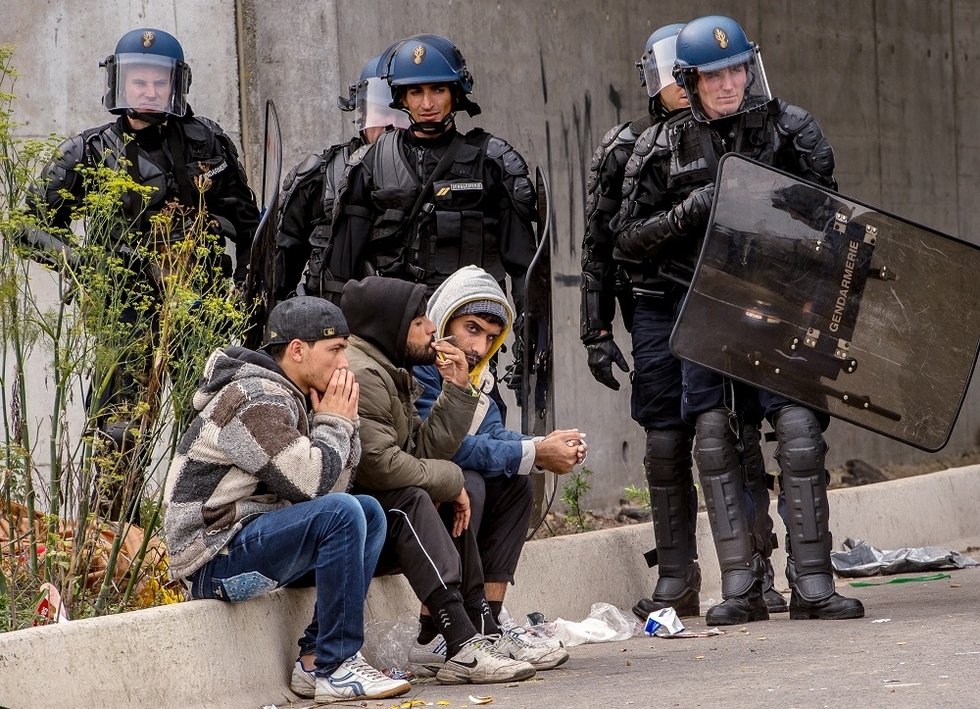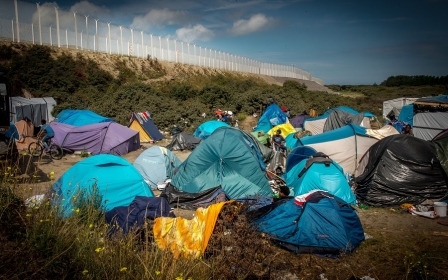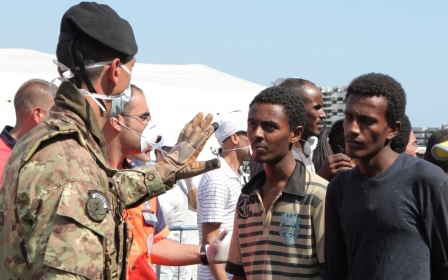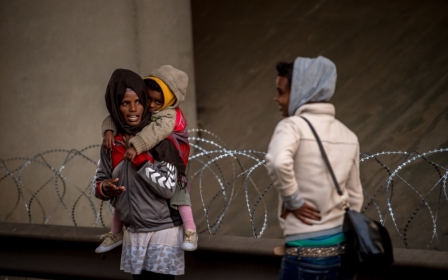The 'Jungle' in Calais endures as refugees look toward England

CALAIS, France - “When I will be in London, I will think of going back to Syria.”
Like many in the Calais refugee camp known as the “Jungle”, the Syrian man didn’t want to be identified, fearing for the lives of his family still based in Syria. Like many others still, his goal was to reach the UK and London, though not for any love of the British government or its prime minister.
“David Cameron is bad luck! I hate him and hate his government because they are thieves!” he told Middle East Eye.
Though the developing crisis in the Balkans has taken away much of the spotlight from the French coastal town of Calais in recent months, the Jungle is still the major hub in Western Europe for refugees and migrants attempting to cross the Channel Tunnel for what they hope will be a better life in the UK.
Around 5,000 people are currently living in the makeshift camp with arrivals from Sudan, Iraq, Afghanistan, Iran, Syria, Eritrea and other countries forming an, at times, uneasy multicultural mix. The camp is covered in litter, as local collection services don’t enter. Doctors of the World and Doctors Without Borders (MSF) have attempted to deal with the health situation as best they can, but there are signs that they could be fighting a losing battle.
On Friday, a joint report between Doctors of the World and Birmingham University in the UK condemned the hygiene situation in the camp as “diabolical” and slammed European governments for failing to provide for the residents.
“This study exposes the awful truth about the Calais refugee crisis – that it is a humanitarian emergency of the first order in one of the world’s most thriving nations,” said Leigh Daynes, the director of Doctors of the World.
“Internationally agreed standards for the provision of aid and protection in refugee situations are nowhere to be found in Calais. That is a blight on the reputation of European states, who should and can do better, as they often do in refugee crises elsewhere.”
There are 40 toilets in the camp, one for every 75 inhabitants and the risk of contagion is high.
“It is an absolutely abject situation in Calais, there are harmful levels of bacteria and the hygiene situation is appalling,” said Dr Thom Davies, one of the Birmingham University researchers.
The makeshift camps first appeared in 1999 when French authorities realised that people were trying to use this route to get to England. The number of Jungle residents has since waxed and waned but with wars and economic disparity continuing to grip parts of Africa, the Middle East and Asia, French authorities have failed to stem the influx of people.
Over the years, semblances of communal culture have developed in the camp. There is a ramshackle cafe selling food, tea and coffee with a widescreen TV showing sport and Arabic music videos.
Communal religious centres have also been set up for the mostly Muslim and Christian inhabitants of the camp.
But no-one relished the idea of staying in the Jungle for the long haul, particularly not those who had gone from middle-class standards of living to squalor.
One refugee, who declined to be named, told MEE he had fled from Raqqa in Syria - where he had once had a relatively comfortable living as a lawyer - only 25 days before arriving here.
Raqqa is currently regarded as the main stronghold for the Islamic State (IS), a situation the refugee told us he endured for around two years, but which had become simply unbearable.
“You can’t live under their control,” he told us. “They are savages, crazy, savage aliens!”
“IS is worse than Assad, much worse. Under Assad, it was a dictatorship. But there were schools, there were institutions, there were banks. Just don’t talk in politics or the dictatorship.”
An air of despair hangs over many refugees and migrants in the camp, who are struggling to make sense and meaning of a life full of so much tragedy. The lawyer from Raqqa told us that as a result of his experiences he had given up on many of the aspirations that a man of his age would have normally looked forward to.
“I don’t have family in Raqqa, I am single. I am not married and I would not [get married],” he said.
“I don’t want to bring a human being to suffer in this world. I prevent myself [from doing] a lot of things just not to bring to life a human being in this miserable world.”
‘Not a problem’
A kilometre away from the Jungle, Calais is a quiet and peaceful city. Refugees are walking down the streets and spend time in parks in the city centre. At lunchtime the cafes are closed. Locals carry on with their daily lives.
“The migrants are not a problem at all for people in Calais,” said a French taxi driver in his 60s.
“The Syrians are very nice.”
He told MEE how he happily drove a man from Sweden into the camp a week ago, where he picked up members of his family and then took them on the journey back to Sweden.
However, he expressed concern about the fact that new refugees arrived at the camp everyday but very few leave. The border with the UK is almost impossible to cross and attempts often end up in failure and a drive back to the Jungle.
“The border is closed, there is no way they can get into the UK,” he said. “And yet more and more are coming.”
Despite this apparent acceptance of the situation, there have been nine incidents of aggression against refugees since June, who are frequently being teargassed and beaten up by unknown assailants, often from the French far-right.
Marine Le Pen, leader of the far-right National Front (FN) - and who is according to some polls leading the way to be the next president of France - has repeatedly attacked the camp as “lawless” and criticised its establishment, a move which appears to be winning her support in Calais.
A poll released by polling website Odoxa in late September showed that the FN is expected to win the first round of local elections in the Nord-Pas-de-Calais region in December.
Though the presence of the migrants has been a major source of support for the FN in the region, high unemployment rates have also been a major factor. Many now say they see the FN as an anti-establishment alternative to mainstream parties that are not willing to make tough decisions and say the unsayable.
More ‘security’
On the afternoon of 30 September, when MEE visited the Jungle, around 50 policemen and state security policemen patrolled the camp during the daily food distribution for the first time. They explained that there will be a daily patrol for “security reasons”. None of the volunteers on the site or refugees knew that this new measure would be implemented.
The municipal government in Calais has taken strong measures to prevent refugees from attempting to cross on the Eurotunnel site. New barriers have been built extending 20 kilometres, and sniffer dogs and policemen have been deployed.
“They have cut down all the vegetation around the site to spot the refugees more easily,” the taxi driver said, complaining about the fact that it used to be a beautiful green place full of various plants and trees. “They have also installed heat scanners to detect if there are human beings hiding in the trucks,” he explained.
At night, when the attempts to cross the border occur, police vans patrol the highway and drive near the site to deter refugees. Night after night a game of cat and mouse ensues - refugees try to hide in the remaining vegetation or under the highway bridges until night comes and the police crews try to stop them. MEE witnessed police using tear gas against a group of refugees hiding in some trees near the highway. As the group of about 10 men tried to run, the police gave chase. In less than a minute though, their van became stuck in a muddy field again, allowing the men to run away.
Police have also tried to prevent volunteers and journalists from approaching the site, invoking security reasons. While they tried to suggest that MEE should leave, our team was able to gain access.
An incomplete journey
Despite the heavy police presence, people keep trying to get through. Overnight on Friday, 113 migrants managed to get into the Eurotunnel and walk for 15 kilometres before they were caught and returned.
For others, however, there is a more grisly fate. Last week a 20-year-old Iraqi man named Omar was crushed to death in a truck while attempting to cross the channel.
His cousin was with him at the time and later returned to the Jungle, where he told MEE his story.
"There were six of us. It (the truck) was full of stock," he said, visibly upset. "The stock filled it from the middle to the end. And so it was empty from where the driver sits to the middle. The stock was extremely heavy. Omar sat in the middle, between the stock and the driver."
"We were waiting for the driver to go through border control towards England, but he didn't. He went towards Belgium."
"He was driving very fast, I kept yelling for him to stop!"
"I opened the roof window and I was banging on the roof. The driver was afraid and didn't stop."
"When I was banging on the roof the driver pressed the break sharply."
"Can you imagine where all the stock moved? On top of Omar."
His cousin, who appeared gaunt and traumatised by the experience, said he attempted to pull Omar out from under the stock.
"I tried so hard, I tried!" he said. "I just couldn't, I wasn't strong enough!"
"They took him to the hospital, directly to the morgue."
Omar's death marks just the latest tragedy in the saga of the European refugee crisis.
As governments in Western and Eastern Europe continue to juggle economic, social and political footballs in an attempt to finally arrive at a settlement for the thousands of refugees and migrants attempting to find a better life in the world's richest countries, few believe that the fields and dirt tracks under the Jungle will be open any time soon.
For many migrants and refugees, the Jungle is destined to remain home for some time to come.
Stay informed with MEE's newsletters
Sign up to get the latest alerts, insights and analysis, starting with Turkey Unpacked
Middle East Eye delivers independent and unrivalled coverage and analysis of the Middle East, North Africa and beyond. To learn more about republishing this content and the associated fees, please fill out this form. More about MEE can be found here.




